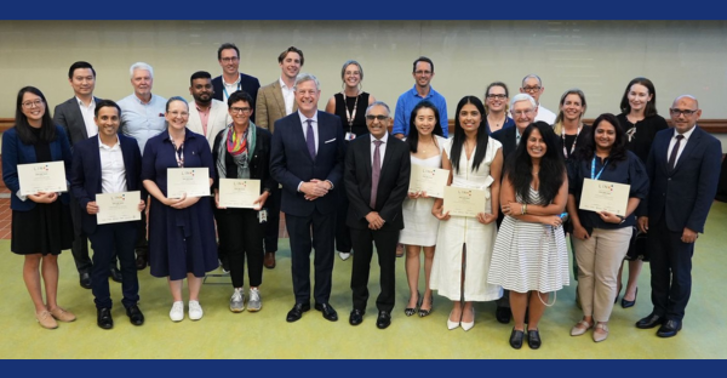
The gut microbiome’s role in a rare and complex form of inflammatory bowel disease (IBD) is under the microscope at Mater Research, thanks to a prestigious $50,000 annual grant from the Gastroenterological Society of Australia (GESA).
The grant was awarded to Dr Rabina Giri, an early career researcher.
Dr Giri’s project, titled Exploring and Defining the Mucosal Microbial Immunomodulatory Function in PSC-UC, will investigate primary sclerosing cholangitis-associated ulcerative colitis (PSC-UC)—a rare but serious condition where liver disease and inflammatory bowel disease occur together, often with a higher risk of bowel cancer.
Dr Giri said that while researchers know the gut microbiome plays an important role, most studies have only described which bacteria are present.
“Our project will go further by looking at how gut bacteria actually function, what signals and chemicals they produce, and how these influence inflammation and disease,” she said.
“By combining patient samples and preclinical disease models, we aim to uncover the specific microbial activities that make PSC-UC different from ulcerative colitis alone.
“This could lead to new ways of predicting, preventing, or treating disease for people living with PSC-UC.
“We are very grateful for their support in advancing research that has the potential to improve the lives of people living with PSC-UC.”
As a member of the Inflammatory Bowel Disease Research Group, Dr Giri joined Mater Research as an undergraduate in 2018 and completed her PhD in 2024 under the supervision of Associate Professor Jake Begun. Her research focuses on the intersection of microbiology, immunology, and gut health—areas critical to improving outcomes for patients with chronic gastrointestinal conditions.
Earlier this year, Dr Giri was also awarded the Strategic Grant for Outstanding Women, a $90,000 Mater Foundation supported initiative supporting women in STEM. This funding is enabling her to establish a new research stream exploring how gut microbiota regulates cancer-associated signalling in colorectal cancer. Her work is particularly timely, as early-onset colorectal cancer rates have nearly tripled among Australians aged 30–39 since 2000.
She is also co-leading a TRI LINC-funded project investigating JAK-STAT biomarkers as predictors of treatment response in chronic pouchitis, a condition affecting patients with ulcerative colitis who have undergone surgery. The study aims to personalise treatment using the drug tofacitinib.
As she transitions toward research independence, Dr Giri is also investing in leadership development through the UNSW Emerging Leaders Program and international collaborations.
“I’m excited to expand the lab’s capabilities and contribute to Mater’s mission of advancing translational research with real clinical impact,” she said.
“I also want to sincerely thank my mentor and colleagues in the Inflammatory Bowel Disease Research Group, our dedicated clinical trial unit and the wider Mater Research team. Their expertise, commitment, and collaboration make it possible to translate discoveries from the lab into meaningful outcomes for patients.”



